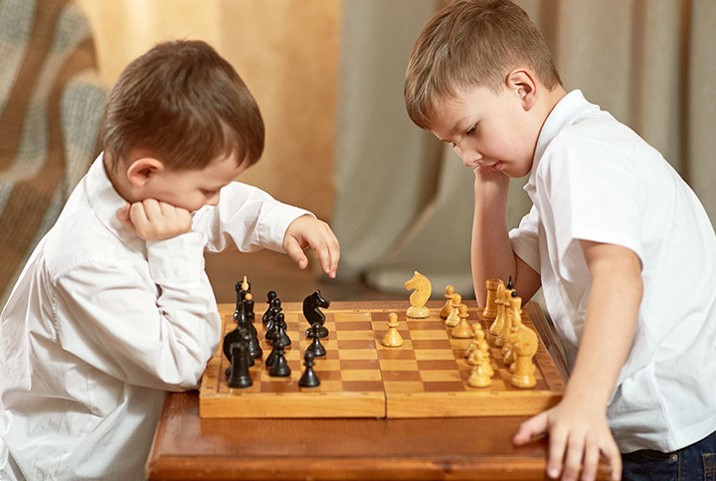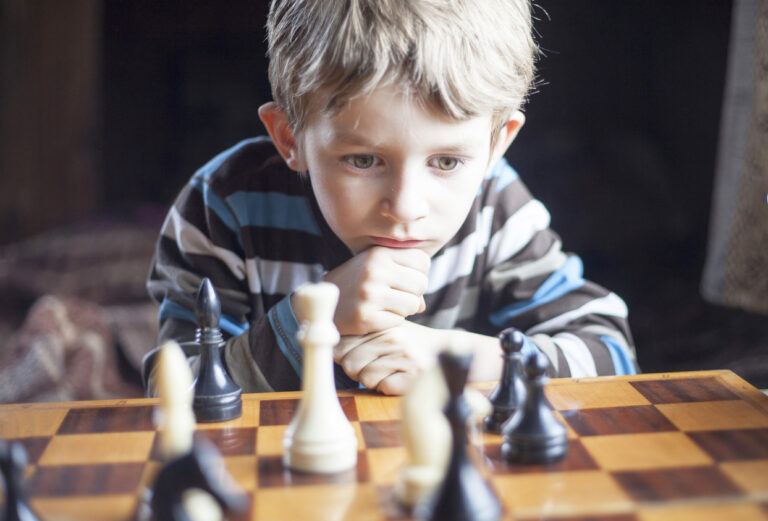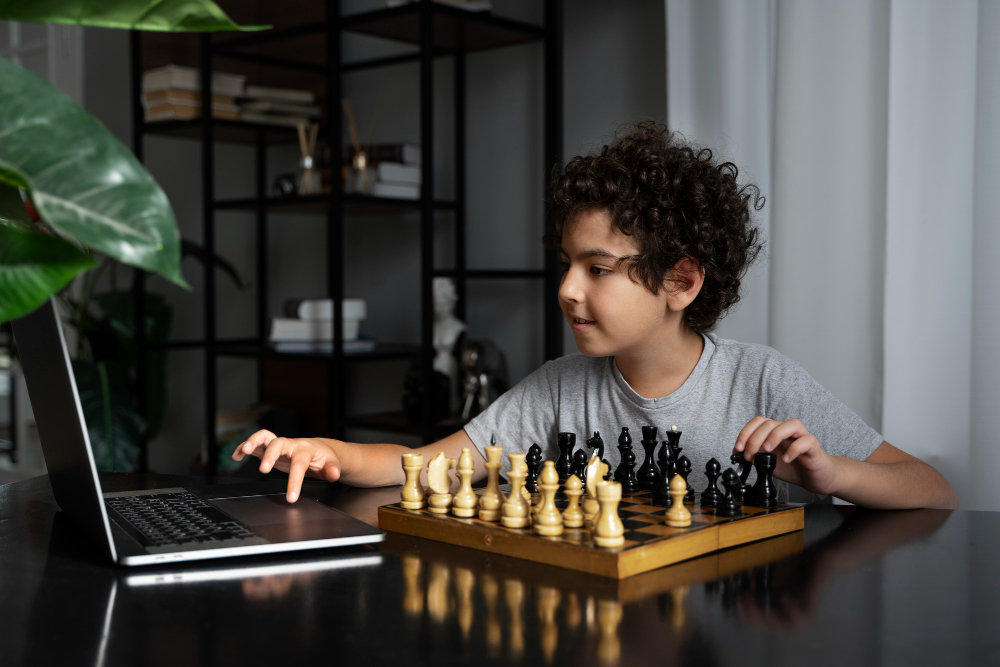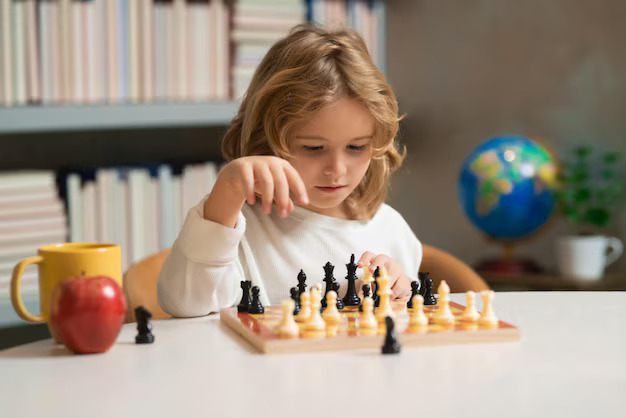In today’s fast-paced world, children face many challenges—from school pressure to social expectations. One of the most important skills they can develop to navigate these challenges is mental resilience. Mental resilience is the ability to bounce back from setbacks, stay calm under pressure, and keep moving forward despite difficulties. While many activities can help build resilience, chess is a unique tool that strengthens a child’s mental toughness in a structured and engaging way.
What is Mental Resilience?
Mental resilience is the ability to recover from difficulties, adapt to change, and keep moving forward even when things get tough. It’s about having the mental strength to handle setbacks and the flexibility to learn from mistakes without giving up.
For children, building resilience early on is crucial for navigating school, friendships, and personal challenges. The earlier kids learn how to handle stress, failure, and uncertainty, the better prepared they’ll be for the challenges life throws their way.
Chess helps children develop this mental toughness by giving them opportunities to practice problem-solving, manage emotions, and think critically in a competitive yet supportive environment.
Facing Setbacks and Learning from Mistakes
One of the key ways chess builds resilience in children is by teaching them how to handle setbacks. In chess, losing is a natural part of the game, and even the best players lose from time to time.
Every game, whether won or lost, is a learning experience. Children quickly realize that making mistakes is not the end of the world; it’s part of the learning process.
For example, when a child loses a piece because of a poor move, they immediately see the consequences. But instead of dwelling on that mistake, chess encourages them to adjust their strategy and keep playing.
This teaches children that mistakes don’t define them. Instead, it’s how they respond to those mistakes that matters.
This mindset helps children become more resilient, as they learn to see challenges as opportunities for growth rather than reasons to give up.
Developing Patience and Perseverance
One of the core lessons chess teaches is the value of patience. Unlike many fast-paced activities where immediate results are rewarded, chess requires players to slow down, think ahead, and carefully consider each move.
This level of thought and patience naturally translates into greater mental resilience because children learn that success doesn’t happen overnight—it requires careful planning, persistence, and the ability to wait for the right moment.
Waiting for the Right Moment
In chess, rushing into a move without fully considering the consequences can lead to mistakes. Children learn early on that hasty decisions often backfire, and that it’s better to take their time, evaluate the situation, and wait for the right opportunity.
This patience builds resilience because it teaches kids to be deliberate in their actions, both in the game and in life.
Whether it’s preparing for an exam, dealing with social situations, or pursuing a long-term goal, chess shows kids that good things come to those who are willing to put in the time and effort.
Over time, they learn to approach challenges with a calm and thoughtful mindset, knowing that persistence pays off.
Never Giving Up, Even When It’s Hard
Chess can be difficult, especially for beginners. There will be times when a child feels like they’re losing or that the game is too hard.
But chess teaches them that even when the situation seems hopeless, it’s important to keep trying. In many games, a player can turn the tide with a single brilliant move, but that can only happen if they keep playing and don’t give up.
This lesson in perseverance is one of the most important aspects of mental resilience. In life, kids will face setbacks—whether it’s failing a test, losing a game, or struggling with friendships.
Chess helps them develop the mental strength to keep going, even when things seem tough. They learn that challenges can be overcome, but only if they keep trying and don’t lose hope.
Managing Emotions and Handling Pressure
Another important part of building mental resilience is learning how to manage emotions, especially in high-pressure situations. Chess helps kids develop emotional control by putting them in situations where they must stay calm and think clearly, even when the stakes are high.
Staying Calm Under Pressure
In chess, a single bad move can cost the game, so players need to remain focused and calm throughout. When kids play chess, they learn how to manage their anxiety and frustration, especially when they’re under pressure to make a quick decision or when they’re losing.
This emotional control is crucial for building resilience, as it helps children handle stress in a healthy way.
For example, imagine a child who is down a piece in a chess game and feels like they might lose. Instead of panicking or giving up, chess teaches them to keep a cool head and look for opportunities to turn the game around.
This ability to stay composed, even in difficult situations, helps children develop a more resilient mindset that they can apply to real-life challenges, like managing school stress or handling conflicts with friends.
Learning to Handle Both Winning and Losing
Another essential part of mental resilience is learning to handle both success and failure gracefully. Chess teaches kids to win with humility and lose with dignity.
In every chess game, one player wins, and one player loses. The way children respond to both outcomes shapes their emotional resilience.
When a child wins a chess game, they learn to take pride in their success without becoming overconfident. At the same time, when they lose, they learn that it’s okay to lose—what matters is what they learn from the experience.
Losing teaches them that failure isn’t final. It’s just a step toward improvement, and it gives them the chance to reflect on what they can do better next time.
Building Problem-Solving Skills

At its core, chess is a game of problem-solving. Every move presents a new challenge, and players must constantly evaluate their options, think ahead, and adjust their strategy.
This type of thinking not only sharpens a child’s mind but also helps them develop the mental resilience needed to solve problems in real life.
Thinking Several Steps Ahead
In chess, players must think several moves ahead to be successful. It’s not enough to focus on the current situation—they need to predict their opponent’s moves and plan accordingly.
This forward-thinking approach helps children become better problem-solvers by teaching them how to break down complex situations into manageable steps.
For example, a child playing chess may need to figure out how to protect their king while also planning an attack on their opponent’s queen.
This requires them to think critically about multiple factors at once, weigh different possibilities, and choose the best solution. Over time, this practice strengthens their ability to handle complex problems, both on and off the chessboard.
Adapting to Changing Situations
One of the most valuable lessons chess teaches is how to adapt. In every game, the situation can change quickly—what seems like a winning position can become a losing one in just a few moves.
Children who play chess learn to be flexible and adjust their plans based on new information.
This adaptability is a key part of mental resilience. Life is full of unexpected changes, and children need to be able to adjust when things don’t go as planned.
Whether it’s dealing with a change in school, a personal challenge, or something unexpected, children who play chess are better equipped to adapt and find solutions.
Developing Confidence in Problem-Solving
As children become more skilled at chess, they start to develop confidence in their problem-solving abilities. They begin to trust their own thinking and become more independent in making decisions.
This confidence is crucial for building resilience because it helps children face challenges with a belief in their ability to overcome them.
When a child successfully navigates a tricky chess position or turns a losing game into a win, they gain a sense of accomplishment that boosts their self-esteem.
This sense of competence carries over into other areas of their life, encouraging them to tackle new challenges with the mindset that they can figure things out, no matter how tough the situation.
Strengthening Focus and Concentration
In a world filled with distractions, the ability to concentrate and focus on a task is becoming increasingly valuable.
Chess helps children develop and strengthen this ability by requiring them to focus intensely for extended periods. Maintaining focus is essential in chess because one small mistake can change the outcome of an entire game.
Sustained Focus Over Time
A typical chess game can last anywhere from 30 minutes to several hours, depending on the format. During that time, players must stay fully engaged, constantly thinking about their next move while also analyzing their opponent’s strategy.
This level of sustained focus can be challenging, especially for children, but it helps them build mental endurance and concentration.

Children who play chess learn to stay focused even when the game becomes difficult or when they’re feeling fatigued. Over time, this ability to concentrate for long periods translates into better focus in school and other areas of life.
Whether it’s staying focused during a long exam or paying attention during class, chess players often find it easier to maintain their concentration because they’ve practiced doing so on the chessboard.
Blocking Out Distractions
Chess also teaches children how to block out distractions. When playing a chess game, especially in a competitive setting, there are often external distractions, such as noise, movement, or the pressure of the clock ticking down.
Players must learn to ignore these distractions and keep their attention solely on the board.
This skill is particularly valuable in today’s digital age, where distractions are everywhere. By learning to focus on the task at hand and ignore interruptions, children become better equipped to handle the many distractions they face in everyday life.
Whether it’s turning off their phones while studying or staying focused during a busy day at school, chess players develop a mental discipline that helps them stay on track.
Managing Mental Fatigue
Chess is mentally demanding. After a long game, players often feel mentally tired because of the intense focus and decision-making required. However, regularly playing chess helps build mental stamina.
Children learn to push through mental fatigue, stay focused, and make smart decisions even when they’re tired.
This resilience to mental fatigue is another aspect of mental toughness that chess builds. In real life, kids often face tasks that require sustained mental effort, whether it’s completing homework, studying for exams, or participating in sports.
Chess teaches them how to manage their energy and stay mentally strong, even when they’re feeling drained.
Chess Teaches Emotional Regulation

Emotional regulation—the ability to control one’s emotions—is a key component of mental resilience.
Chess helps children develop this skill by placing them in situations where they must manage their emotions in order to succeed. Whether they’re frustrated by a bad move or excited about a potential win, children learn to control their emotions and focus on the game.
Controlling Frustration
It’s common for children to feel frustrated during a chess game, especially when they make a mistake or fall behind. But chess teaches them that reacting emotionally won’t help them win.
Instead, they need to stay calm, assess the situation, and think logically about their next move.
Over time, children who play chess become better at controlling their frustration, both in the game and in real-life situations.
They learn that setbacks are a part of the process, and instead of getting upset, they develop the habit of thinking through their options and making a thoughtful decision. This skill helps children manage stress and frustration in school, sports, and relationships, making them more emotionally resilient.
Handling Excitement and Success
On the other hand, chess also teaches children how to handle excitement and success. Winning a chess game or making a great move can be thrilling, but chess players must stay focused and avoid letting their excitement cloud their judgment.
Children learn that they still need to think clearly and continue playing carefully, even when they’re in a winning position.
This ability to stay level-headed during moments of success is just as important as managing frustration. It helps children remain humble and composed, understanding that every situation—whether positive or negative—requires focus and attention.
This emotional balance is a key part of mental resilience, allowing children to handle both the highs and lows of life with grace.
Chess and the Growth Mindset

One of the most significant ways chess fosters mental resilience in children is by encouraging a growth mindset. A growth mindset is the belief that abilities and intelligence can be developed through hard work, dedication, and learning from mistakes.
It contrasts with a fixed mindset, where individuals believe their abilities are static and unchangeable.
Learning from Mistakes
In chess, mistakes are inevitable. Even professional players make errors, and every game offers countless opportunities for children to learn from their wrong moves.
Chess teaches that mistakes are not failures but learning experiences. Children understand that each game is a chance to improve their skills, analyze what went wrong, and apply those lessons to their next game.
For example, if a child loses a game because they left their queen unprotected, they learn the importance of protecting key pieces. This lesson sticks with them in future games, where they’ll be more careful about their defense.
Over time, chess players become less afraid of making mistakes because they see them as part of the journey to becoming better players. This mindset translates directly into school and life, where children who embrace challenges and learn from setbacks become more resilient in their approach to all kinds of obstacles.
Embracing Challenges
Chess is a game that constantly presents new challenges. Each opponent plays differently, and every match is unique. To succeed, players must be willing to take on challenges, try new strategies, and push themselves outside their comfort zone.
This aspect of chess helps kids develop the mental resilience to face challenges head-on. Whether it’s mastering a difficult subject in school, learning a new skill, or dealing with personal difficulties, children with a growth mindset understand that challenges are opportunities for growth.
Chess instills this belief, showing children that they can overcome difficulties if they put in the effort and stay open to learning.
Persistence Pays Off
Success in chess rarely comes overnight. Players must invest time and effort into practicing, studying strategies, and reflecting on their games.
The game teaches children the value of persistence—that working hard over time leads to improvement. This lesson is crucial for mental resilience because it shows children that they can achieve their goals, even if progress feels slow at first.
In real life, persistence is a key factor in success. Whether it’s improving grades in school, getting better at a sport, or mastering a musical instrument, the ability to keep going, even when progress is slow, is a hallmark of resilience.
Chess gives children a concrete way to experience this, helping them build the persistence needed to tackle long-term goals.
Building Independence and Responsibility
Chess is an individual game, where every move a player makes is their own responsibility. This personal accountability fosters independence and teaches children to rely on themselves for their successes and setbacks.
This lesson in responsibility is a crucial part of building mental resilience.
Taking Responsibility for Decisions
In chess, every decision—whether it’s a brilliant tactic or a poor blunder—belongs to the player.
Children learn that they are responsible for their moves, and if they make a mistake, they can’t blame anyone else. This accountability encourages children to take ownership of their decisions and reflect on their choices.
This sense of responsibility builds mental resilience by teaching children to evaluate their actions and make better decisions in the future.
Whether they’re handling schoolwork, managing friendships, or making personal decisions, children who play chess understand that their choices have consequences and that they can learn from their mistakes to improve.
Developing Independence
Since chess is a solo game, children must rely on their own thinking, problem-solving, and creativity to succeed.
Unlike team sports, where players can rely on teammates for support, chess requires kids to be self-reliant. This fosters independence, as children learn to trust their own judgment and rely on themselves to navigate the challenges of the game.
This independence builds mental resilience because it teaches children to solve problems on their own.
Whether it’s solving a difficult homework problem or figuring out how to navigate a new social situation, children who play chess have more confidence in their ability to work through challenges independently. This confidence makes them more resilient in the face of difficulties, as they know they can rely on their own skills to find solutions.
Chess as a Lifelong Tool for Mental Resilience
While chess offers immediate benefits for children in terms of focus, patience, and problem-solving, its influence on mental resilience goes far beyond childhood.
The lessons learned from chess—such as handling setbacks, thinking critically, and maintaining emotional control—are skills that carry through life. Chess fosters a mindset of continuous improvement and perseverance, which serves as a strong foundation for personal and academic growth.

Preparing Kids for Real-Life Challenges
The mental resilience that children develop through chess prepares them to face a wide range of challenges in life. Whether it’s dealing with academic pressure, managing difficult relationships, or overcoming personal struggles, kids who play chess are better equipped to handle adversity with confidence and calm.
Chess teaches them that every setback is temporary, and with the right approach, any challenge can be turned into an opportunity for growth.
A Lifelong Companion for Mental Fitness
The beauty of chess is that it’s a game that can be enjoyed for a lifetime. As children grow older, the mental resilience they’ve built through chess continues to benefit them in adulthood.
Playing chess keeps the mind sharp, improves problem-solving abilities, and provides a constructive way to handle stress and maintain mental balance. It’s a lifelong activity that continues to challenge and strengthen the mind.
Wrapping it up
Chess is much more than a game—it’s a powerful tool that helps children develop essential life skills like patience, problem-solving, emotional control, and mental resilience.
Through chess, kids learn to handle setbacks, think critically, and face challenges with confidence. The mental toughness built on the chessboard translates directly into real-life success, helping children navigate academic, social, and personal obstacles.
At Global School of Chess, we are committed to teaching children not just the moves, but the mindset needed to succeed in life. Ready to help your child build mental resilience? Visit Global School of Chess to get started.
READ NEXT:

